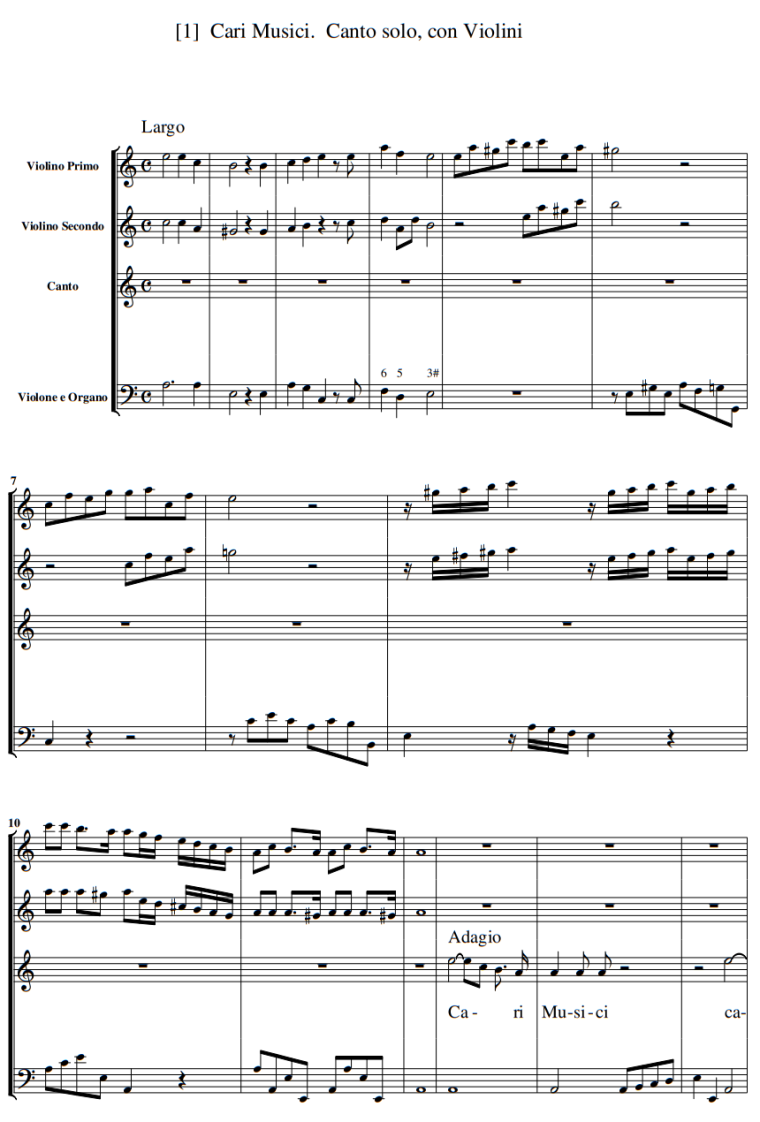Ellen Taaffe Zwilich (30 aprile 1939): Prologue and Variations per orchestra d’archi (1983). Indianapolis Symphony Orchestra, dir. John Nelson.

Contrariamente a quanto comunemente si crede, le donne che si sono dedicate alla composizione musicale sono numerose, e tutte sono degne di nota :)
Ellen Taaffe Zwilich (30 aprile 1939): Prologue and Variations per orchestra d’archi (1983). Indianapolis Symphony Orchestra, dir. John Nelson.

Augusta Read Thomas (24 aprile 1964): Capricious; toccata-like da Two Thoughts About The Piano (2017). Daniel Pesca, pianoforte.

Imogen Holst (12 aprile 1907 - 1984): The Unfortunate Traveller per ottoni e percussione (1929). The Grimethorpe Colliery Band, dir. Robert Childs.

Florence Price (9 aprile 1887 - 1953): The Mississippi River, poema sinfonico (1934). The Women’s Philharmonic, dir. Apo Hsu.

Berta Alves de Sousa (8 aprile 1906 - 1997): Preludio I per pianoforte. Sofia Lourenço.

Berta Alves de Sousa (al pianoforte)
Bianca Maria Meda (c1665 - c1700): Cari musici, mottetto per soprano, 2 violini e basso continuo (da Mottetti a 1, 2, 3 e 4 voci con violini e senza, 1691, n. 1). Roberta Invernizzi, soprano; ensemble Bizzarrie Armoniche, dir. e violoncello Elena Russo.
Cari musici, cum grato silentio
Voces comprimite,
Suspendite sonos,
Cantare cessate,
Et contemplate dilecte
Jesu amores.
Non me turbate, no, amante,
Armonici chori
Cantare, cessate.
Quantae deliciae
Quantae fortunata beant me,
Rapit meum cor ad se
Jesus solus voce amante.
Quanta laetitia
Quanta me divina replet lux
In amore verus dux
Mihi donat gaudia tanta.
Ah! Quid dico! Anima ingrata,
in silentio taciturno
Amores sponsi audio sepelire,
Ah non tacete, no,
O voces canorae,
Non tacete.
Amare et silere, cor,
Tentas impossibile,
Plus tormentum sit terribile
Quando curat reticere.
Tacere et ardere, no,
Non potes tam firmissime,
Tuae pene sunt durissimae,
Si tacendo vis languere.
Alleluia.

Elisabetta Brusa (3 aprile 1954): Simply Largo per archi (2011). I Solisti Veneti, dir. Claudio Scimone (in concerto pubblico: Padova, 8 marzo 2011).

 Els Aarne (nome d’arte di Else Paëmuru; 30 marzo 1917 - 1995): Seconda Sinfonia (1966). Eesti Riiklik Sümfooniaorkester, dir. Neeme Järvi.
Els Aarne (nome d’arte di Else Paëmuru; 30 marzo 1917 - 1995): Seconda Sinfonia (1966). Eesti Riiklik Sümfooniaorkester, dir. Neeme Järvi.
La prima «voce» del Dizionario di musica della Utet (Deumm), sezione Biografie (l’anno di pubblicazione è il 1985), è dedicata a Els Aarne.
Sonia Bo (27 marzo 1960): Come nella memoria, tre pezzi per pianoforte (1996). Francesco Conti.

Teresa Procaccini (23 marzo 1934): Sonata rapsodica per violoncello e pianoforte op. 8 (1957). Gianluca Giganti, violoncello; Desirée Scuccuglia, pianoforte.

Elsa Barraine (1910-20 marzo 1999): Sinfonia n. 2 (1938). Orchestre National de l’ORTF, dir. Manuel Rosenthal.

Anna Clyne (9 marzo 1980): Within Her Arms per archi (2008-09), dedicato alla memoria della madre. Philharmonia Orchestra, dir. Elim Chan.

Claude Arrieu (pseudonimo di Louise-Marie Simon; 1903 - 7 marzo 1990): Quintetto in do maggiore per flauto, oboe, clarinetto, corno e fagotto (1953). Quintette à Vent du Conservatoire du Luxembourg.

Carlotta Ferrari (1975): Shiva, meditazione per organo (2005). Luca Massaglia.
Carlotta Ferrari: Toccata in modo gravitazionale per organo (2003). Carson Cooman.

Maryanne Amacher (25 febbraio 1938 - 2009): Synaptic Island, versione abbreviata (1999).
Maryanne Amacher: Living sound per serie di “stanze collegate acusticamente” (1980).

Elfrida Andrée (19 febbraio 1841 - 1929): Konsertuvertyr in re maggiore (1873). Sveriges Radios Symfoniorkester, dir. Michael Bartosch.

Maria Teresa Agnesi Pinottini (1720 - 19 gennaio 1795): Concerto per clavicembalo e archi. Barbara Petrucci, clavicembalo; Il Quartettone, dir. Carlo De Martini.

Valborg Aulin (9 gennaio 1860 - 11 gennaio 1928): Sonata per pianoforte in fa minore op. 14, Grande Sonate sérieuse (1885). Lucia Negro.

Jennifer Higdon (31 dicembre 1962): Concerto per violino e orchestra (2008; Premio Pulitzer 2010). Solista: Hilary Hahn (dedicataria della composizione); Royal Liverpool Philharmonic Orchestra, dir. Vasilij Petrenko.

Peggy Glanville-Hicks (29 dicembre 1912 - 1990): Etruscan Concerto per pianoforte e orchestra da camera (1954). Keith Jarrett, pianoforte; Brooklyn Philharmonic Orchestra, dir. Dennis Russell Davies.
Nella partitura, ciascun movimento reca in esergo una citazione da Etruscan Places di David Herbert Lawrence:
«You cannot think of art, but only of life itself, as if this were the very life of the Etruscans dancing in their coloured wraps with massive yet exhuberant limbs, ruddy from the air and the sea-light, dancing and fluting along through the little olive trees out in the fresh day.»
«There is a queer stillness and a curious peaceful repose about the Etruscan places…»
«There seems to have been in the Etruscan instinct a real desire to preserve the natural humour of life. And that is a task surely more worthy, and even more difficult than conquering the world.»

María Teresa Carreño García de Sena (22 dicembre 1853 - 1917): Ballade per pianoforte op. 15. Alexandra Oehler.

Rebecca Saunders (19 dicembre 1967): Dust per 1 percussionista (2017-2018). Rebecca Lloyd-Jones.

Maria Szymanowska (14 dicembre 1789 - 1831): Notturno in si bemolle maggiore per pianoforte. Roberto Piana.

Michèle Reverdy (12 dicembre 1943): Dix musiques minutes per violino, viola e violoncello (1994). Guy Comentale, violino; Laurent Verney, viola; Dominique de Williencourt, violoncello.

Rachel Portman (11 dicembre 1960): The Emperor’s New Clothes, suite sinfonica dalla colonna sonora dell’omonimo film (2001) di Alan Taylor.
Un film molto garbato, ambientato a Parigi ma girato in buona parte 🙂 a Torino, ha come protagonista Ian Holm nei panni di Napoleone: il quale, dopo Waterloo, potrebbe aver avuto una sorte assai diversa da quella che raccontano i libri di storia…
A very lovely film, set in Paris but partly shot in Turin, stars Ian Holm in the role of Napoleon: who, after Waterloo, may have had a very different fate from the one the history books tell…

A poster from The Emperor’s New Clothes. In the background on the left you can see the Valentino Castle in Turin, which in the film fiction becomes a Parisian building.
Alma Maria Schindler, nota anche come Alma Mahler Werfel (1879 - 11 dicembre 1964): Laue Sommernacht, Lied su testo di Otto Julius Bierbaum (talvolta erroneamente attribuito a Gustav Falke). Angelika Kirchschlager, mezzosoprano; Helmut Deutsch, pianoforte.
Laue Sommernacht: am Himmel
Steht kein Stern, im weiten Walde
Suchten wir uns tief im Dunkel,
Und wir fanden uns.
Fanden uns im weiten Walde
In der Nacht, der sternenlosen,
Hielten staunend uns im Arme
In der dunklen Nacht.
War nicht unser ganzes Leben
Nur ein Tappen, nur ein Suchen-
Da: In seine Finsternisse
Liebe, fiel Dein Licht.
(Mite notte d’estate: non c’è stella nel cielo, nell’ampia foresta ci siamo cercati e ci siamo trovati.
Ci siamo trovati nell’ampia foresta nella notte senza stelle, stupefatti ci siamo tenuti fra le braccia nella notte oscura.
Tutta la nostra vita non era che un cercare, un brancolare. Là, nella sua oscurità, amore, è caduta la tua luce.)
Lo stesso Lied nell’orchestrazione di Jorma Panula. Lucie Ceralová, mezzosoprano; Norddeutsche Philharmonie, dir. Manfred Herrman Lehner.

 Elvira de Gresti (1846 - 10 dicembre 1913): Tantum ergo sacramentum a 4 voci miste con accompagnamento d’organo ad libitum. Coro polifonico Castelbarco, dir. Luigi Azzolini; Stefano Rattini, organo.
Elvira de Gresti (1846 - 10 dicembre 1913): Tantum ergo sacramentum a 4 voci miste con accompagnamento d’organo ad libitum. Coro polifonico Castelbarco, dir. Luigi Azzolini; Stefano Rattini, organo.
Tantum ergo sacramentum
veneremur cernui
et antiquum documentum
novo cedat ritui.
Praestet fides supplementum
sensuum defectui.
Genitori genitoque
laus et jubilatio
salus, honor, virtus quoque
sit et benedictio.
Procedenti ab utroque
compar sit laudatio.
Amen.
Josephine Lang (1815 - 2 dicembre 1880): Arabeske in fa maggiore per pianoforte (pubblicato postumo nel 1905). Mario L. S. Barbosa.

Agathe Backer-Grøndahl (1° dicembre 1847 - 1907): Suite in sol minore per pianoforte op. 20 (1887). Geir Henning Braaten.

Dame Elizabeth Violet Maconchy Le Fanu (1907 - 11 novembre 1994): Nocturne per orchestra (1950-51). Foundation Philharmonic Orchestra, dir. David Snell.
